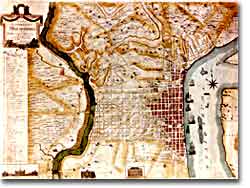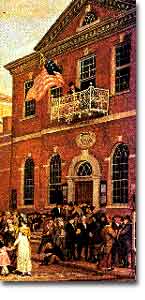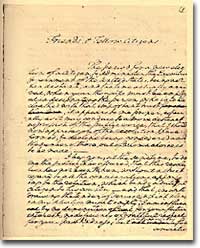Jonathan Bernstein writes:
The big, urban states traditionally did very well in the electoral college… . New York used to be a major swing state; California also was very contested once it became large, and even Texas had a run as a competitive state with big cities for a while. For whatever reason, all of that has slipped some over the last twenty or thirty years … Still, all else equal, a presidential candidate would rather pander to a large state with lots of winner-take-all electoral votes than a small one, which should tend, over time, to balance out the small-state advantage in the Senate.
17d. Farewell Address

The commercial center of Philadelphia in 1796 was located along the western shore of the Delaware River.
Washington departed the presidency and the nation's then capital city of Philadelphia in September 1796 with a characteristic sense of how to take dramatic advantage of the moment.
As always, Washington was extremely sensitive to the importance of public appearance and he used his departure to publicize a major final statement of his political philosophy.WASHINGTON'S FAREWELL ADDRESS has long been recognized as a towering statement of American political purpose and until the 1970s was read annually in the U.S. Congress as part of the national recognition of the first President's birthday. Although the celebration of that day and the Farewell Address no longer receives such strenuous attention, Washington's final public performance deserves close attention.
The Farewell Address definitely embodies the core beliefs that Washington hoped would continue to guide the nation. Several hands produced the document itself. The opening paragraphs remain largely unchanged from the version drafted by James Madison in 1792, while most of the rest was penned by Alexander Hamilton, whom Washington directed to remove the bitterness from an intermediate draft that the president himself had written. Although the drawn out language of the Address follows Hamilton's style, there is little doubt that the core ideas were not only endorsed by Washington but were beliefs that he and Hamilton had developed together as the new nation's leading nationalists.
The Address opened by offering Washington's rationale for deciding to leave office and expressed mild regret at not having been able to step down after his first term. Unlike the end of his previous term, now Washington explained, "choice and prudence invite me to quit the political scene, patriotism does not forbid it." Washington was tired of the demands of public life, which had become particularly severe in his second term, and looked forward to returning to Mt. Vernon.

George Washington delivered his Farewell Address from Congress Hall in Philadelphia.
Although he might have closed the Address at this point, Washington continued at some length to express what he hoped could serve as guiding principles for the young country. Most of all Washington stressed that the "NATIONAL UNION" formed the bedrock of "collective and individual happiness" for U.S. citizens. As he explained, "The name of AMERICAN, which belongs to you, in your national capacity, must always exalt the just pride ofPATRIOTISM, more than any appellation derived from local distinctions."
Washington feared that local factors might be the source of petty differences that would destroy the nation. His defense of national unity lay not just in abstract ideals, but also in the pragmatic reality that union brought clear advantages to every region. Union promised "greater strength, greater resource, [and] proportionately greater security from danger" than any state or region could enjoy alone. He emphasized, "your UNION ought to be considered as a main prop of your liberty."
The remainder of the Address, delivered at CONGRESS HALL in Philadelphia, examined what Washington saw as the two major threats to the nation, one domestic and the other foreign, which in the mid-1790s increasingly seemed likely to combine. First, Washington warned of "the baneful effects of theSPIRIT OF PARTY." To Washington POLITICAL PARTIES were a deep threat to the health of the nation for they allowed "a small but artful and enterprising minority" to "put in the place of the delegated will of the Nation, the will of a party."

George Washington's handwritten copy of his famous Farewell Address. Alexander Hamilton helped Washington edit his first draft.
Yet, it was the dangerous influence of foreign powers, judging from the amount of the Address that Washington devoted to it, where he predicted the greatest threat to the young United States. As European powers embarked on a long war, each hoping to draw the U.S. to its side, Washington admonished the country "to steer clear of permanent Alliances." Foreign nations, he explained, could not be trusted to do anything more than pursue their own interests when entering international treaties. Rather than expect "real favors from Nation to Nation," Washington called for extending foreign "commercial relations" that could be mutually beneficial, while maintaining "as little political connection as possible." Washington's commitment to NEUTRALITY was, in effect, an anti-French position since it overrode a 1778 treaty promising mutual support between France and the United States.
Washington's philosophy in his Farewell Address clearly expressed the experienced leader's sense that duty and interest must be combined in all human concerns whether on an individual level or in the collective action of the nation. This pragmatic sensibility shaped his character as well as his public decision-making. Washington understood that idealistic commitment to duty was not enough to sustain most men on a virtuous course. Instead, duty needed to be matched with a realistic assessment of self-interest in determining the best course for public action.

The commercial center of Philadelphia in 1796 was located along the western shore of the Delaware River.

George Washington delivered his Farewell Address from Congress Hall in Philadelphia.

George Washington's handwritten copy of his famous Farewell Address. Alexander Hamilton helped Washington edit his first draft.
